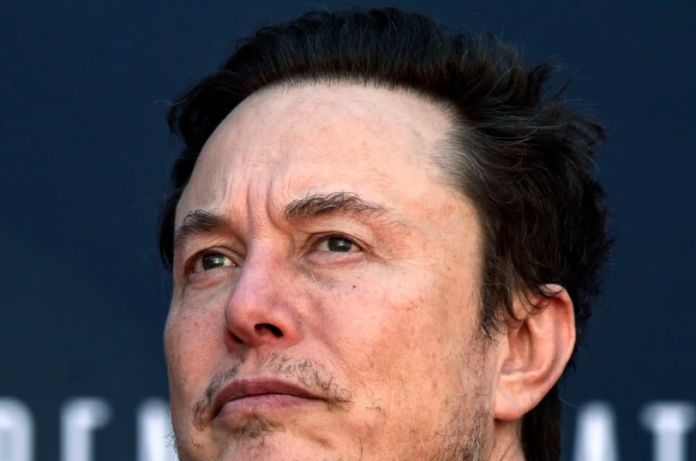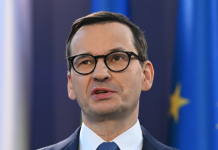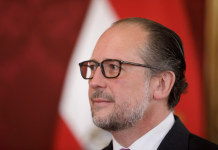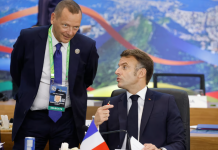News of the talks comes shortly after the Italian PM visited President-elect Donald Trump in Florida.
The Italian government confirmed on Monday it is in talks with Elon Musk’s SpaceX over a possible €1.5 billion deal for secure telecoms — a move certain to infuriate European industry.
The government, led by hard-right Prime Minister Giorgia Meloni, is in the late stages of negotiations with SpaceX to buy secure communication services, Bloomberg reported Sunday. The deal had been in the works for more than a year but had stalled, according to the report.
Meloni visited U.S. President-elect Donald Trump at his resort in Mar-a-Lago, Florida this weekend.
tellite system, but it confirmed talks are taking place.
“Talks with SpaceX form part of the normal dialogue that the government has with companies, in this case with those that offer protected connections for encrypted communications,” her office said.
However, Meloni “categorically” denied that she discussed SpaceX with Trump, describing the assertion as “simply ridiculous.”
According to the Bloomberg report, the contract would last five years and has already been approved by the Italian intelligence services and Ministry of Defense. If successful, SpaceX would provide encryption services for the government and communications infrastructure for the military and emergency services.
Musk’s Italy representative Stroppa said in his post that the deal would save Italy more than €8 billion and would be up and running in a few months, rather than the eight to 10 years it would take competitors. Stroppa is one of the people named in an Italian probe of alleged corruption in public procurement contracts, Reuters reported last year.
SpaceX did not respond to POLITICO’s request for comment.
European Commission spokesperson Thomas Regnier said Brussels hasn’t yet received any information from the Italian authorities, adding that Italy is a sovereign state and can sign deals.
‘Unacceptable sell-out’
The possibility of a deal with a Musk-owned company has enraged some, as the billionaire tech mogul is in the middle of a political row with Germany and the U.K. sparked by his provocative social media posts.

Antonio Misiani, former deputy finance minister and senator for the opposition Democratic Party, told POLITICO that if the deal is confirmed, it would amount to an “unacceptable sell-out of national sovereignty.”
An agreement would mean that Italy would be buying services from “a company owned by a well-known tycoon closely linked to the American and international ultra-right,” rather than from Italian and European companies, Misiani said.
The Rome government was already pressing ahead with plans to use Starlink satellite-based internet connectivity to help it meet EU-imposed digital transition commitments.
Meloni, now seen as Europe’s Trump-whisperer, has also developed a close relationship with Musk.
The kind of encrypted telecommunication services being sold by Musk is similar to what the EU is looking to offer through its own IRIS² project, a €10.6 billion network of cyber-secure satellites that has been approved but will only go online after 2030.
Governments have also been slow to signal they will actually use the European system.
As part of torturous negotiations to get IRIS² off the ground, Italy secured one of the constellation’s three ground stations to be located at Fucino, which experts presumed would help Rome buy into the initiative.
What’s more, the Italian government recently commissioned its own aerospace leader Leonardo to start work on an ultra-secure national space-based cloud storage network for its army, but that would take years and billions of euros to get up and running.
Others have warned Rome that the new Starlink contract would make it too reliant on Musk.
Alexandra Geese, a German Greens member of European Parliament, said on BlueSky that the deal “hands over Italian government, defense and military communication to an unpredictable proto-fascist … European security is at stake!”
Matthew Hodgson, a co-founder of Matrix, a secure communications protocol that has been used by the U.S. Navy and multiple European governments, said in an interview that if Italy relies too heavily on SpaceX it could be in a position where it can’t “talk to anybody at all” if Musk’s services went down or were pulled.
“That’s the horrible, horrible failure mode that I can easily see the Italians falling into,” he warned.
Sam Clark reported from Brussels, Hannah Roberts from Rome and Joshua Posaner from Berlin. Ben Munster also contributed reporting from Rome.






















